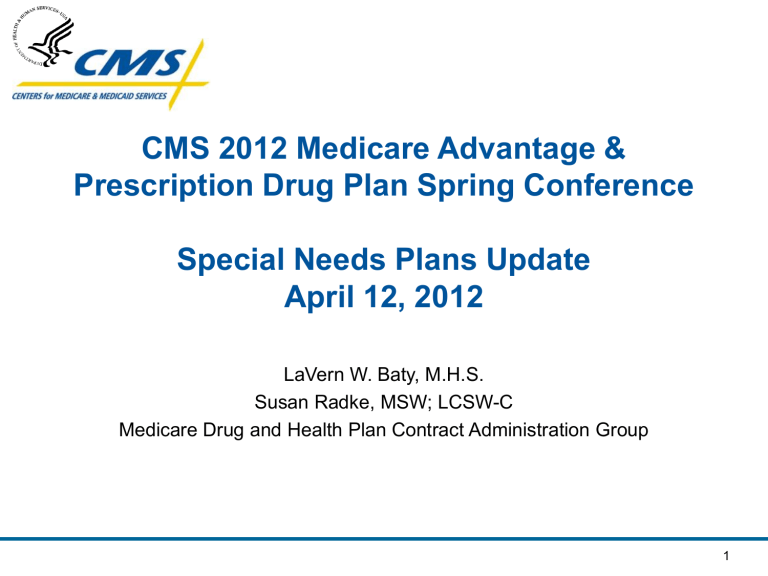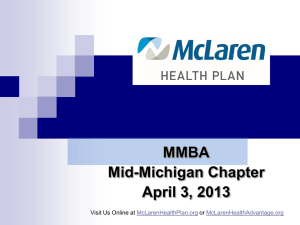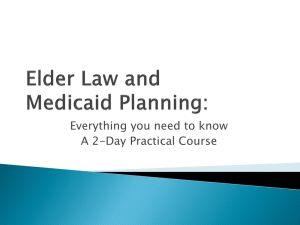D-SNP Types - Onstream Media

CMS 2012 Medicare Advantage &
Prescription Drug Plan Spring Conference
Special Needs Plans Update
April 12, 2012
LaVern W. Baty, M.H.S.
Susan Radke, MSW; LCSW-C
Medicare Drug and Health Plan Contract Administration Group
1
Overview
• Legislative Overview – MIPPA & the Affordable Care Act
(ACA)
• State Medicaid Agency Contracts
• MIPPA Contract Elements
• D-SNP Types
• Subcontracting Arrangements
• FIDE-SNP Definition and Determination
• Questions & Answers
2
Legislative Overview – MIPPA & ACA
• The Medicare Improvements for Patients and Providers Act of 2008 ( MIPPA ) requires a contract between a D-SNP and the State Medicaid agency
• MIPPA’s goal is to strengthen integration and coordination of
Medicare & Medicaid benefits through D-SNPs
• MAO’s offering D-SNPs were required to have a contract with the State Medicaid Agency if the D-SNP was changing its D-
SNP type, expanding the service area or applying for an initial
D-SNP
• The Affordable Care Act of 2010 ( ACA ) extended deadline/effective date of the MIPPA contract provision, and;
• Requires All MAOs offering D-SNPs to have a State contract beginning 1/1/13
• Defines fully integrated dual eligible SNPs (FIDE-SNPs)
3
State Medicaid Agency Contracts
The State Medicaid Agency Contract submittal and review process is now automated in HPMS. All D-SNPs are:
• Required to submit the “State Medicaid Agency Upload
Document” that provides CMS with status of the State
Medicaid Agency contract negotiations by February 21, 2012
• Required to submit a signed and executed 2013 State
Medicaid Agency Contract with a corresponding 2013 D-SNP
State Medicaid Agency Contract Matrix Upload Document for each State by July 1, 2012
4
State Medicaid Agency Contracts
State Responsibilities for D-SNP Contracting:
• Not mandated to contract with all D-SNP applicants or cover all service areas
• Have the option to selectively contract with D-SNPs
• Other than coordination and integration of Medicare &
Medicaid benefits, MIPPA did not mandate any specific
Medicaid benefit package
• Contract may cover certain category(ies) or target a subset, e.g., frail elderly
5
State Medicaid Agency Contracts
D-SNP Responsibilities for D-SNP State Contracting
• Communicate frequently with the State in which you seek to offer your D-SNP
• Ensure that the D-SNP type category matches the categories of eligibility listed in the State Medicaid Agency
Contract
• Ensure that the D-SNP type category that matches the eligibility criteria listed in the State Medicaid Agency
Contract also matches your Plan Bid
• Ensure that the State Medicaid Agency Contract meets all 8
MIPPA elements
• Submission of State Medicaid agency contract does not relieve MA applicant of pre-existing requirement to secure license from State Dept. of Insurance
6
MIPPA Contract Elements at 42 CFR 422.107
1.
MAO’s responsibilities, including financial obligations, to provide or arrange for Medicaid benefits
2. Category(ies) of eligibility for dual eligibles to be enrolled under the SNP
3. Medicaid benefits covered under the SNP
4. Cost sharing protections covered under the SNP
5. The identification and sharing of information on Medicaid provider participation
6. Enrollee eligibility verification process for both Medicare and
Medicaid
7. Service area covered by the SNP
8. The contract period for the SNP (e.g. Effective January 1, 2012 –
December 31, 2012; January 1, 2012
– December 31, 2015 or
January 1, 2012 – December 31, 2012 and renews yearly.)
7
D-SNP Types
• All-Dual - Must enroll all types of dual eligibles
• Full-Benefit - Limits enrollment to individuals eligible for full
Medicaid benefits
• Medicare Zero-Cost-share - Limits enrollment to QMBs-only and
QMB+
• Dual eligible subset – Zero Cost-share
• Select when subset enrolls individuals other than just QMB and
QMB+ for whom the State pays Medicare cost-sharing
• Dual eligible subset
• Select when subset enrolls individuals who pay some part of the
Medicare cost-share
• A dual eligible subset and dual eligible subset zero cost-share enrolls any category or combination of Medicaid eligibility categories, as long as CMS approves the subset and the DSNP’s enrollment limitations parallel the structure and care delivery patterns of the
State Medicaid program in the State in which the D-SNP operates
8
D-SNP Types
D-SNP
Sub-Type
All-Dual
QMB QMB+ SLMB SLMB+ QI
Yes Yes Yes Yes Yes
Full-
Benefit
Medicare
Zero
Cost-
Sharing
Dual
Eligible
Subset($
0 & non-
$0)
No
Yes
Yes
Yes
Yes
Yes
No
No
Yes
Yes
No
Yes
No
No
Yes
QDWI FBDE
Yes
No
No
Yes
Yes
No
Yes Yes
9
Correct D-SNP Type
Example D-SNP Type Listed in HPMS
Contract ID Contract Name SNP Type SNP Detail
Z 0001 Health Care for All Dual Eligible All Dual
__________________________________________________________________________
All Dual Contract
State Medicaid Agency Contract
10
Incorrect D-SNP Type
Example D-SNP Type Listed in HPMS
Contract ID Contract Name SNP Type SNP Detail
Z 4444 Health Care for Some Dual Eligible Medicare
$ 0 Cost Share
___________________________________________________________________________
All Dual Contract
State Medicaid Agency Contract
This D-SNP type is incorrect because only QMB and QMB + can be enrolled in a Medicare $0 Cost
Share. The SMA Contract includes other types of dual eligibles.
11
D-SNP Types
REMINDERS
• When selecting D-SNP sub-types: if you needed to convert your
D-SNP sub-type in order to correctly match the State eligibility categories in the State Medicaid Agency Contract, you needed to apply as a new D-SNP
• For bids: the type of D-SNP sub-type entered in HPMS, and identified in the State contract, must conform to the bid submitted
• Contact CMS via the CMS SNP mailbox at:
SNP_Mail@cms.hhs.gov
and your RO Account Manager if the
State in which you seek to offer your D-SNP for CY 2013 has changed is eligibility category and/or your D-SNP type does not match the State Contract
• The subject line in the e-mail should state: “D-SNP Type”
12
Subcontracting Arrangements
• Allows equivalent subcontracting arrangements in limited circumstances provided that:
• The subcontract meets all 8 MIPPA elements
• The D-SNP subcontracts with a State approved Medicaid
MCO for all Medicaid services under the SMA Contract (i.e., not a carve-out for a single service)
• The D-SNP submits a letter from the State indicating its approval of subcontracting arrangement
13
Subcontracting Arrangements
14
Subcontracting Arrangements
15
Subcontracting Arrangements
16
Fully Integrated Dual Eligible SNPs
• Section 1853(a)(1)(B)(iv) of the Social Security Act authorizes CMS to make frailty payments to D-SNPs that are “fully integrated with capitated contracts with States for
Medicaid benefits, including long-term care and that have similar average levels of frailty . . . as the PACE program”
• In order for a SNP to be eligible to receive frailty payments pursuant to section 1853 of the Act, the SNP must: (1) satisfy the FIDE-SNP definition under 42 C.F.R. § 422.2; and (2) have similar average levels of frailty as PACE organizations
17
Fully Integrated Dual Eligible SNPs
A FIDE-SNP:
• Provides dual eligible beneficiaries access to Medicare and
Medicaid benefits under a single managed care organization;
• Has a capitated contract with a State Medicaid Agency that includes coverage of specified primary, acute and long-term care benefits and services, consistent with State policy;
• Coordinates the delivery of covered Medicare and Medicaid health and long-term care services using aligned care management and specialty care network methods for high-risk beneficiaries; and
• Employs policies and procedures approved by CMS and the
State to coordinate or integrate member materials, enrollment, communications, grievance and appeals and quality improvement
18
Fully Integrated Dual Eligible SNPs
In further determining whether a D-SNP meets the FIDE-SNP definition, CMS will only allow Long Term Care benefit carveouts or exclusions if the plan can demonstrate that it meets the following criteria:
The Health Plan:
1. Must be at risk for substantially all of the services under the capitated rate; and
2. Must be at risk for nursing facility services for at least six months
(or one-hundred and eighty days) of the year; and
3. Must not disenroll individuals as a result of exhausting the service covered under the capitated rate; and
4. Must remain responsible for managing all benefits, including any carved-out or excluded services or benefits, notwithstanding the method of payment (e.g., fee-for-service, separate capitated rate) received by the plan
19
FIDE-SNP Determination
• No option in HPMS to self-identify as a FIDE SNP
CMS will:
• Review the State Medicaid Agency Contract to determine whether a D-SNP qualifies as a FIDE-SNP according to statutory and regulatory definitions
• Share information with other components in CMS responsible for administering the Health Outcome Survey
• Notifies health plan if plan receives similar levels of PACE frailty for additional payment
• FIDE-SNPs and certain other D-SNPs may qualify for additional supplemental benefit flexibilities, this is discussed in the next presentation
20
Questions
Any Questions?
• For questions or further clarification, you may contact your
Regional Office Account Manager and/or
• Contact the CMS SNP mailbox at: SNP_Mail@cms.hhs.gov
.
Please make sure you also “cc” your RO Account Manager
21
CMS 2012 Medicare Advantage &
Prescription Drug Plan Spring
Conference
Special Needs Plan Update:
New Benefit Flexibility for Certain Dual Eligible
SNPs
Jaya Ghildiyal, MPH
Medicare Drug and Health Plan Contract Administration
Group
22
New Benefit Flexibility for
Certain Dual Eligible Special Needs Plans
23
Background
• Both the Parts C&D Final Rule and Final Call Letter for MA organizations addressed CMS’s policy for new supplemental benefit flexibility for certain D-SNPs beginning CY 2013
24
Benefit Flexibility for Certain Dual Eligible SNPs
• Gives certain D-SNPs that meet integration, contract design, performance and quality-based standards flexibility to offer additional Medicare supplemental benefits beyond those that CMS currently allows for other MA plans
• These D-SNPs may offer supplemental benefits that may prevent health status decline and reduce the quantity & cost of health care needs
25
Benefit Flexibility for Certain D-SNPs (cont.)
• CY 2013 Final Call Letter describes categories of supplemental benefits that D-SNPs may offer:
• Personal care services in the home
• Non-skilled nursing activities in the home
• Respite care for caregivers
• In-home food delivery
• Adult daycare services
• D-SNPs must describe these benefits as part of their plan benefit packages (PBPs) at the time of bid submission
26
Criteria to Qualify for Benefit Flexibility
• Contract Design Requirements
• Operational in CY 2012 and CY 2013
• Capitate coverage of specified primary, acute and long-term care benefits and services, to the extent that State policy permits the SNP to capitate these services
• Coordinate delivery of covered Medicare and Medicaid primary, acute and long-term care services throughout its entire service area
• Other requirements outlined in the Final Call Letter
27
Criteria to Qualify for Benefit Flexibility (cont.)
• Performance Standards
• Based on CY 2013 Past Performance Methodology for MA and Part D contracts (performance analysis from January 1,
2011 to February 8, 2012)
• Quality-based Criteria
• 3-year approval on their CY 2012 model of care (MOC), and
• Part of at minimum a 3-Star contract, or
• Score of 75% or above on 5 of 7 SNP-specific CY 2011 HEDIS measures (for D-SNPs in contracts without star ratings)
28
Additional Requirements
• D-SNPs that choose to offer additional supplemental benefits must provide these to the beneficiary at zero cost
• D-SNPs that participate in this benefit flexibility initiative to submit an additional mandatory quality improvement project
(QIP)
• D-SNPs will be able to choose this QIP topic from a list of broadly-defined topics designed to assess beneficiary outcomes related to the provision of new supplemental benefits
• Additional supplemental benefits must not inappropriately duplicate existing Medicare, Medicaid or locally available benefits
29
Notification for Qualified D-SNPs
• CMS will determine whether a D-SNP qualifies to participate in this initiative based on the contract design and qualifying criteria outlined in the CY 2013 Final Call Letter
• All applicable D-SNPs that meet the stated contract design and qualifying criteria, will receive written notification at the end of April/early May
30





